Anne LampProteingewinnung aus Bioethanolschlempe
Schriftenreihe technische Forschungsergebnisse, volume 42
Hamburg 2021, 334 pages
ISBN 978-3-339-12130-1 (print)
ISBN 978-3-339-12131-8 (eBook)
About this book deutschenglish
The rising global demand for food proteins poses a growing challenge for the global agriculture. Above all, the growing demand for animal proteins puts a strain on soils and the climate. In the future, plant proteins will have to play an increasingly important role in supplying protein to the world’s population. It is therefore essential to make available alternative protein sources for the food and animal feed market that have not been used up to now, or only used to a limited extent. These include protein-containing side streams from the agricultural industry. One such example is the stillage produced in bioethanol production; the proteins it contains are not yet used in a targeted way, but could be isolated with a high degree of purity and used for example in the food sector.
The challenge in the isolation of stillage proteins is that the proteins have changed their structure as a result of the previous process steps; i.e. they can no longer be separated by „classical“ methods (e.g. in wheat gluten production). Against this background, this thesis investigates possibilities of isolating proteins from grain based bioethanol stillage. The focus is on the chemical and thermodynamic mechanisms that determine the solubility behaviour of proteins. For this purpose, an analysis method for the complete quantification of amino acids in unknown samples is developed. For the subsequent evaluation of the isolability of the proteins from the stillage, the structural configuration of the stillage proteins is investigated. From this, suitable process options for the isolation of the proteins are then identified and experimentally investigated. The aim is to separate the proteins from the stillage with high purity and low yield losses. At the same time, possible structural changes of the proteins will be investigated, as they influence the functional properties and thus the possible applications. From the results of the experimental investigations, a final assessment is made as to which process option is best suited for the recovery of stillage proteins.
